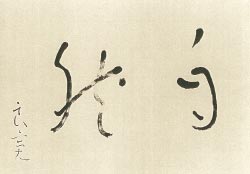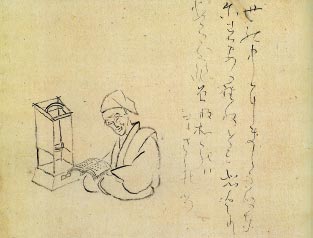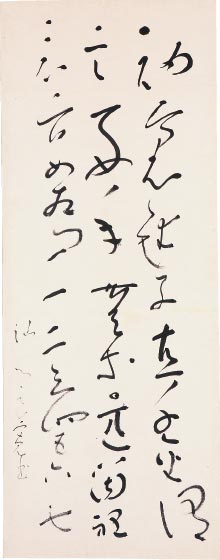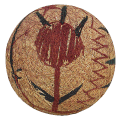Ryōkan’s calligraphy appears all the more pure and simple because of his character and lifestyle. He never put on airs and lived with ease and warmth. His artistry naturally flowed out of his disposition and his vast knowledge. At first glance, what appears to be almost childlike, his calligraphy has a profundity and elegance that cannot be equaled or seen elsewhere.



It’s not that I don’t want the camaraderie
of others in this world; how much more I prefer to amuse myself alone.

This is a very famous work entitled ‘A Drawing of Reading’. The figure shown is of Ryōkan reading by a paper lantern. It has been said that the drawing was made by Ryōkan himself. The expression ‘hitori asobi-amuse himself alone’ means he enjoyed reading books, composing Japanese and Chinese poems, and doing calligraphy. This famous tanka depicts Ryōkan’s serene state of mind.
This is a very famous work entitled ‘A Drawing of Reading’. The figure shown is of Ryōkan reading by a paper lantern. It has been said that the drawing was made by Ryōkan himself. The expression ‘hitori asobi-amuse himself alone’ means he enjoyed reading books, composing Japanese and Chinese poems, and doing calligraphy. This famous tanka depicts Ryōkan’s serene state of mind.
This temari ball in my kimono sleeve
Has as much value as a thousand pieces of gold.
I guess I’m so good at it no one can bounce it better.
Should anyone ask me the meaning of this game,
I’d have to reply one two three four five six seven’s
The boundless breadth of the universe and Buddha’s love

Has as much value as a thousand pieces of gold.
I guess I’m so good at it no one can bounce it better.
Should anyone ask me the meaning of this game,
I’d have to reply one two three four five six seven’s
The boundless breadth of the universe and Buddha’s love

Translated into Modern Japanese by Katō Kiichi
English translation by Kitajima Fujisato

English translation by Kitajima Fujisato
This poem can be interpreted as follows: The ball in my
sleeve is worth a thousand pieces of gold and no one else
can bounce it better than me. If someone were to ask the
meaning of bouncing the ball, I would answer that it is
the limitless expansion of the universe and the Buddha’s
infinite compassion.

